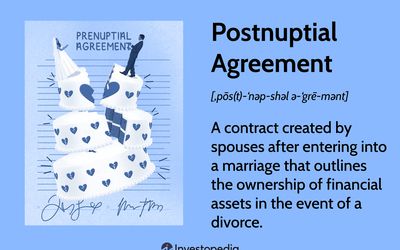
Prenuptial agreements, commonly referred to as prenups, are legal documents that couples sign before entering into marriage, outlining the division of assets and responsibilities in case the marriage ends in divorce or separation.
They have gained popularity over the years as individuals seek to protect their financial interests and clarify expectations within the marriage. However, the interaction between prenups and mortgages is an often overlooked aspect that can have significant implications for both parties involved.
This article aims to provide a thorough understanding of how prenuptial agreements can affect mortgages.
Understanding Prenuptial Agreements
A prenuptial agreement is a legally binding contract that is negotiated and signed by both parties before marriage. Its primary purpose is to establish the distribution of assets, including properties, in the event of divorce or separation.
Prenups can cover various financial aspects, such as property ownership, debt management, spousal support, and more. While prenups are more common among individuals with substantial assets, they can be beneficial for anyone seeking to safeguard their financial interests.
How Does a Prenup Agreement Work?
A prenuptial agreement, or prenup, is a legal contract between individuals planning to marry. It outlines how assets and financial matters will be handled if the marriage ends in divorce or separation.
Prenups can address property division, spousal support, and other financial aspects, providing clarity and protection for both parties.
Read More: Pros and cons of investing in stocks
How Can A Prenup Agreement Impect A Mortgage?
A prenup can impact a mortgage by clarifying property ownership, debt responsibilities, and equity distribution in case of divorce. It defines how these factors are to be handled, protecting both parties’ interests and preventing potential disputes over mortgage-related matters.
Buying A Home With An Existing Prenup Agreement
When buying a home with an existing prenup, it’s crucial to understand how the agreement affects the property. The prenup might stipulate whether the property is considered joint or separate ownership. If it’s joint, both spouses share ownership and potential profits upon sale. If separate, one spouse’s ownership might remain protected.
Additionally, the prenup could impact mortgage responsibilities and equity distribution if the marriage ends. Consulting legal experts is vital to ensure compliance with the prenup and relevant property laws, preventing future conflicts and safeguarding each party’s rights when acquiring a new home.
Buying A Home As An Unmarried Couple
When unmarried couples buy a home, legal and financial considerations differ from those of married couples. Ownership structure, mortgage responsibilities, and exit strategies should be carefully planned.
Cohabitating individuals should consult legal professionals to create agreements addressing property division, investment contributions, and potential contingencies, ensuring a clear understanding and protection for both parties.
Read More: What is an fha loan and how does it work
The Impact of Prenups on Mortgages
Property Ownership: One of the key areas influenced by prenuptial agreements is property ownership. In the context of a mortgage, a prenup can specify whether a property purchased during the marriage will be considered joint property or separate property.
This distinction becomes significant if the marriage ends, as joint property is subject to division, while separate property remains with its original owner.
Debt Liability: Mortgages often involve substantial debts that couples take on jointly. A prenup can outline the responsibilities of each spouse regarding mortgage payments and how the debt will be divided in case of divorce. This can protect one spouse from being burdened with the entire mortgage obligation if the relationship dissolves.
Equity Distribution: Prenups can address the distribution of property equity in the event of divorce. For instance, if one spouse contributes a larger portion of the down payment or mortgage payments, the prenup can establish a formula for determining how much of the property’s equity they are entitled to receive.
Protecting Separate Property: If one spouse enters the marriage with a property they solely own, a prenup can specify that the property remains their separate property even if it appreciates during the marriage. This can prevent the property from becoming subject to division during divorce proceedings.
Spousal Support Considerations: Some prenuptial agreements contain clauses related to spousal support (alimony). These clauses can outline the amount and duration of support payments in the event of divorce. Mortgage payments and property ownership can influence these clauses, as they directly impact the financial standing of each spouse post-divorce.
Enforceability and Considerations
It’s important to note that while prenuptial agreements can significantly impact mortgages, their enforceability varies based on jurisdiction and specific circumstances. Courts generally uphold prenups that are entered into voluntarily, with full financial disclosure, and without any signs of coercion. Both parties should have independent legal representation to ensure fairness and prevent potential challenges to the agreement’s validity.
FAQ’s
What are the disadvantages of a prenuptial agreement?
Prenuptial agreements can strain trust and communication, focus on potential divorce, and lead to unequal asset division if not fairly negotiated, potentially causing conflict and resentment between spouses.
Does a prenup protect your house?
Yes, a prenup can protect your house by specifying its ownership and distribution in case of divorce, safeguarding it from being subject to division.
Can a prenup protect against future assets?
Yes, a prenup can protect future assets by outlining how they should be treated in the event of divorce, ensuring they remain separate and not subject to division.
Can a prenup protect my house?
Yes, a prenup can protect your house by clearly stating its ownership, division, and financial arrangements, ensuring its preservation in the event of divorce or separation.
How do I draft a prenup that protects future assets?
To draft a prenup protecting future assets, clearly define assets, describe their separate ownership, and detail how they remain untouched in divorce. Consult legal professionals to ensure validity and enforceability.
Conclusion
Prenuptial agreements can have substantial implications for mortgages within a marriage. They provide a means for couples to define the ownership and financial responsibilities associated with properties, mortgages, and debts.
If you are considering a prenup, it’s essential to consult with legal professionals who specialize in family law and real estate to draft an agreement that aligns with your interests and complies with relevant laws. By addressing these matters proactively, couples can secure their financial well-being and streamline potential complexities in the event of divorce or separation.
✓ The Role of Ginnie Mae (GNMA) in the Housing Market
✓ Understanding Non-Owner-Occupied Mortgages and Interest Rates





